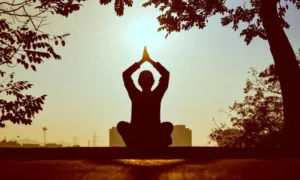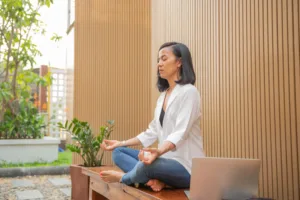Negative self beliefs, positive thinking and compassion – An Interview with A Monk
We hosted an interview with a Buddhist Monk Pasura from Thailand. Monk Pasura is one of the Monks who trained Samavira’s founder Lauren when she lived in a Buddhist monastery in Thailand.
We spoke about negative self beliefs, positive thinking, compassion and more. Enjoy the read! 🙂
First of all, I’d like you to introduce yourself a little bit and say who you are, what you do in life, which is quite obvious, but nonetheless. And what should we know about you?
Well, my name is Monk Pasura and I’ve been a monk for 17 years. I became a monk at 28, but I also had the chance to practice meditation at a very young age and ongoing until I became a monk. But after I became a monk, I also got the chance to conduct meditation sessions in many countries across the world, more than 70 countries so far.
So generally, my part would be to introduce and also explain how meditation really works so that everyone can benefit from the practice of meditation, regardless of their race, religion or belief. Because it emphasizes how to develop the state of mind for being conscious and more aware.
The mind versus the body. Some people say that our minds are more tired than our bodies are. Would you agree or how do you see this? And what do you say about this?
Actually, I totally agree with that statement because you use your mind and when you feel tired, you just sit down and rest. You just watch Netflix, YouTube, and you think you’re resting, but your mind doesn’t rest at all. In this case, you’re actually still using your mind.
Not to mention, when you have a lot of stuff in your mind and you go to sleep, you actually have this crazy dream that makes you feel even more excited because your mind keeps on working all night long taking all of those thoughts into account, into working all night. So basically your mind doesn’t learn to rest or to slow down at all. So that makes your mind even more tired.
But our bodies when we feel exhausted, you can decide to take a deep breath to kind of settle it out a bit, take a shower, take a hot bath and that’s a lot easier. But as for the mind, we tend to forget it. The thing is that we don’t see the mind, so it’s easy for us to neglect taking care of our mind because we don’t see it. Then you forget we have it.
The body is kind of easy to feel, but the mind, the hard part of that is we don’t see it and it becomes a habit to have an exhausted mind. When you have a lot of troubles and you just keep adding them up without resolving them, it’s kind of like suppressing and pressing them in a can.
So it keeps adding up until you become unhappy. Some people think it is normal for us to be stressed out, depressed, or unhappy. While it’s actually not. We are supposed to be happy. This becomes easier when we establish a mind-body connection.
So would you say that the actual natural state of the mind is to be calm, content, happy, peaceful, right?
Yeah, exactly. That is the spiritual state of mind when there’s nothing involved or interrupting. It’s just like when you stay still, you don’t really do anything. You feel relaxed, at ease. That should be the normal state of the mind. Whenever the mind gets tense, that means that the mind has woken up.
Then the mind starts to jump around, catching stuff and grip on things without letting go. So that’s what happens with the mind. It now acts like an octopus rubbing all these tentacles, and holding on to things and never letting go. So it becomes tense the whole time.
Whenever you meditate, you start to feel like everything’s kind of unwinding. You notice that you’re feeling like your insides are loosening up, feel kind of hollow and kind of broaden it within yourself, that is actually the sign that your mind is already sort of like releasing the grip.
But we can’t do it consciously at first, and as days go by, we have more responsibilities and more things to do, and whenever you let go of one thing, there’s still something else to grab on anyway. So you, you kind of need those kinds of practices in order to tell the mind, ‘hey, this is the time. I just want to lay it down, let it go’, so that you can place them all up front and then see whatever needs to be worked on later.
When you face a challenge, what do you do? How do you go about finding a solution for that?
Pause first. A lot of the time we like to react. You know, reaction is like when you throw a ball against the wall it just bounces right back. So the harder you throw it, the harder it bounces back. So that’s the reaction. And it tends to come back with a lot of strength, a lot of emotions, a lot of energy going right back at the problem.
And that doesn’t really solve it, it’s more like you’re just pointing an arrow straight into the problems. So what I really do when things really get rough is to sort of pause and step back a bit. So, just instead of it becoming a wall, it’s like you have a perforated wall, something that’s softer and it really softened the impacts.
Then things tend to bounce back a bit softer. When you’re no longer part of the puzzle, you start to see things in a different perspective. That way your thoughts become more logical. You start to see the answer in different ways. Things become more responsive rather than reactive. And that for me, is really helpful.When things get really, really rough.
Sometimes, some problems actually don’t need to be solved much at all. We just need to wait a bit more for things to resolve themselves. A lot of times, we want to take control of every little aspect and want everything to turn out the way we expect it to be.
And that’s tough because we end up being overworked unnecessarily and sometimes we make it even worse.
In other words, if you want to have a better idea, you have to think outside of the box. But as long as you’re in the box, you can’t think ‘outside of the box’. So if you want to think outside of the box, you’ve got to step out of the box first.
You know, as long as you’re part of the things in the box, you won’t see anything else. You’ll still see the frame, so you have to step away and look at it from the top. And be like ‘I’m not in the box now. I see all the players in the box’.
And it’s also like sometimes we try to really convince someone of our viewpoints, but we talk to them while they are still in their box as well. So it’s the same principle.
Would you say that meditation is, for most people, the most powerful modality that can help with this? Or would you say meditation and other modalities, or does it depend on the type of person that you are? How do you see that?
I know that meditation sounds kind of like a serious practice. I want us to think a little bit back to the days when there wasn’t much technology. Every culture around the world had these kind of silent moments to yourself. In every culture, in every civilization, you’d pray, chant, meditate and have some silent moment before you go to bed.
You know, like when you tuck your kid in bed, you read a nice story for them to focus on something positive. That should be the time that we have for ourselves. Basically, in the old days that was what we had. But these days, we are bombarding ourselves with a lot of media, from the phones or the tablets, televisions, until we don’t really have a silent moment for us to reflect.
And when we don’t reflect on what happened to us or what we should do in future, or what am I standing for right now at the moment, we can’t let go. So we can just keep adding it up and it never gets resolved because we have to reflect on what we have been putting out.
And we think that by just putting it in the back of our own mind, just like under a carpet, we pretend it doesn’t exist and everything will be just fine. But it’s not! Because I know that it’s right there in the back of my head.
Whenever I’m down, whenever I’m vulnerable, that’s when it comes back and that’s when it hurts me the most. So if we get that chance to have that silent moment to look inside to, just to make a little reflection of things that need to be let go, things that need to be resolved, that need to be dealt with later on.
We categorize them. Now I’m settled. I know where I stand. I know where I need to go next. And that makes life more stable and peaceful.
What do you believe are the biggest causes of negative self-beliefs? Where do you believe it comes from, that negativity?
It’s just like when you were born, there’s already a lot of bacteria in your stomach. There’s a lot of fungus, bacteria on your skin. If you put it into a microscope, you can see them. So it has always been something that we accumulate over a lifetime and it’s there waiting for when we are weak.
Whenever we are weak, it means that our immune system is low, which affects us. It makes us sick. Same as our mind. It has this for a long time throughout our lifetime, we keep adding up and each time we let our mind wander, be affected by people, situations, circumstances, until our anger, our frustration, our jealousy, egos start to stir up, we’re adding up more and the more that we make a stir up, the more we cash on them, we are adding up more. It leads to having low compassion for oneself.
So that’s how we accumulate and carry it to the next life. That’s the thing. Whenever our mind is negative and we have negative self-beliefs, let’s say if the water is blue, everything I see will be blue, right? Which means I perceive the world in a blue color, instead of seeing the world according to reality.
So basically if the blue color is anger, that means I will see the world based on my anger. So my thoughts, my words and actions will be based on my anger, which is going to be a bit more violent, more hurtful, more spiteful.
And that will of course create a negative effort on me. When they say something bad to me, like they don’t like me, instead that will stir up my mind even more. Then it can generate more negative actions. So it’s kind of a vicious cycle, it keeps going on and on.
That’s why we focus on going back to the source. How can we actually keep our minds all steady and become more aware so that we can keep ‘the ink’ intact. And then when that ink is intact, it starts getting clearer. Now I can have clear thoughts and that leads to better words and better actions, which means it leads to more positive thinking, more positive consequences and a more positive self-image, so I kind of reverse the cycle with that.
Basically meaning that it doesn’t really matter as much where it comes from, because we are actually born with it. What matters more is what you do with it. It’s like you try to complain that you have fungus on your body and be like, ‘who put it in my body?’
It doesn’t help you if you know who put it in there, but it matters if you know a way to kill it.
So, as a monk, how do you suggest we deal with negative self-beliefs mind-wise?
Technically, each time you’re meditating those things (the ink) get filtered out. We call it the purification process. You actually get to filter out each time you’re meditating. But the problem is that the moment you open your eyes after meditation, the mind tends to go out and capture more. So this leads to the next part, which is the lifestyle I was talking about. Because a disciplined lifestyle will help you keep your mind more mindful, by becoming more aware and at least making it less distracted.
Which means, let’s say you have a hundred percent of ink and you filter out, let’s say 5%, so when you go on the day, that 5% is already added back. But if you become more mindful, you probably add back like 2%. So when you meditate again, you reduce under the five and then you add more tools.
So it’s kind of reducing overtime. But if we don’t do this, we’ll keep adding up just like before, or even more. But if you keep meditating, eventually you’ll eventually win. That’s actually what it is. And of course it is going back to the way your lifestyle is. That’s why meditation is one part.
It helps you get deeper and become more aware. And then if you carry that awareness outside, your interaction with others will be from a place of peace, kindness and compassion. And eventually, there will be no more ink added as you continuously clean out the ink.
What about negative habits, like bad habits, impulse, all those things? How should we deal with those? Is it a similar process? Is it different?
Similar, but a bit more action oriented because all habits come from repetitive actions. Everything that we say, do or think repeatedly becomes a habit, and the moment it becomes a habit, it’s kind of an automatic program that we already install.
So the moment it is triggered by the stimuli it’s activated. Just like when you see someone that you don’t like, you just get irritated automatically. Even if that person doesn’t do anything, they’re just sitting right there. Their breathing is enough to make you irritated, which doesn’t make sense at all. Right? And that’s because it’s the habit of the mind that we have already developed.
Which means I have to consciously change the cause of the action when I have been in contact with that trigger. And if I keep changing that direction repeatedly, it will create a new part of the habits or a new part of the program that will be activated the moment I see the triggers. So that will change.
Actually, there’s a science behind that. Habit is basically created by two neurons in our brain. So whenever this neuron is triggered, it will send some sort of connection to the other neuron for action, so they become a path. And the more often you trigger, the more often you will create the path and they become more liquidated.
And this moment that we created in our brain is there for a lifetime. It doesn’t get erased, that’s the thing. So, you can never erase your old habit. You can only create a new path. And you just need to make this new path become more liquidated than the first one until the neuron’s signal will automatically jump to some other one instead of this initial one.
Which is quite interesting because some people say that you can weaken that path but you have to replace it instead so that it still weakens, but more because the new one becomes stronger than the initial path.
That’s actually research from people with alcoholic associations, shows that even people who are sober for like 10 years, when they hit a really big bomb that they can’t solve, they can go back to drinking because that old path is still there. So basically it means we have to be really careful with which bad habits or negative habits we fall into because they may bite you in the ass.
They can come back anytime and certainly when the trigger is very strong. But it doesn’t go away. It means that if you become more mindful about what’s going on, you can always stick to the new path.
Why do you think that people these days mostly seek quick fixes? To improve, get better, get rid of things. Why is that?
Generally, humans love to have quick fixes because that’s easy. But what my master explains is that now we live in the world of everything industrialized.
So it’s not like in the old days where you lived in an agricultural society and you didn’t have a lot of facilities, where you just had to learn how to wait. You learn to wait for the season to come, for the rain to fall, for the crops to grow. So you cannot speed up the process. But these days we tend to rely so much on everything around us that we want the outcome to happen immediately, and life’s getting more comfortable and we create a new habit as well.
Like I remember back then, I had to use the old telephone which, unlike today, took quite some time to dial in the numbers to make a call. So, I learned to be patient. But now when I see a text loading as the circle is running, I get frustrated, because of all these advanced technology around us that slowly developed into a habit of wanting the result immediately.
So that means we just have to reverse the habit in order to learn to wait, because everything in life does not happen spontaneously. There are things that we have to plant the seed and wait for it to grow.
Everything around us is speeding up, so we are trying to speed up as well, including when it comes to wellness and introspection, reflection.Which is tough because people confuse information, knowledge, skills, and wisdom.
They’re not the same. People tend to believe that information they search on the internet is everything. As long as it does not transfer into who you are, it will never become your wisdom. If you cannot practice it, it will never be your skill. So information is something that anyone can get, but wisdom and skills are individual.
If you’d like to read the other parts of the interview as well, you can find them here:
Enjoyed this article? Share it!
Keep reading!

Ways to Deal With Discomfort and Pain
Many of us are going through the challenge of pain or discomfort on a daily basis. Depending on the severity, this can stop people from

5 Best Types of Music for Meditation
1. Ambient Music What It Is: Ambient music is a genre characterized by its atmospheric, immersive quality. It often features subtle melodies, slow tempos, and

How Meditation Can Enhance Emotional Connection in Relationships
In recent years, meditation has gained widespread attention for its profound impact on personal well-being. But did you know it can also play an important

Embracing Stillness: 4 Simple Meditation Techniques for Overcoming Cravings
Cravings can be relentless, whether you’re dealing with the urge to eat unhealthy foods, the pull of an addictive substance, or even the compulsion to

Sleep Better, Live Better: Meditation for Insomnia Relief
Insomnia affects millions of people worldwide, leading to various health issues such as fatigue, irritability, and a weakened immune system. One effective method to combat

Clarity Amidst Chaos: How to Use Meditation for Concentration and Focus
Let’s talk about why meditation for concentration and focus is important. Focus is a crucial aspect of daily life that allows individuals to concentrate their





